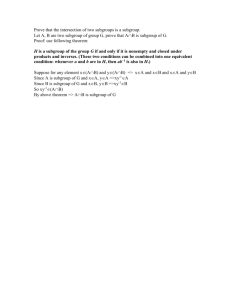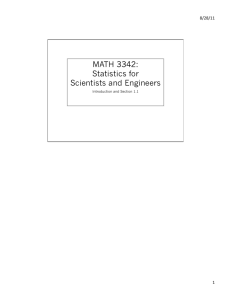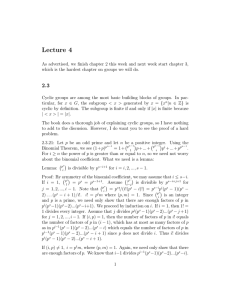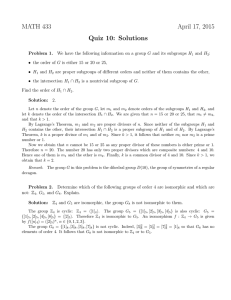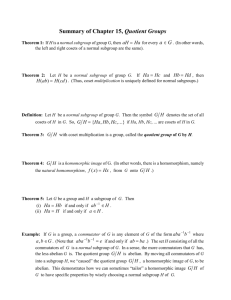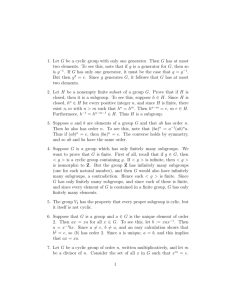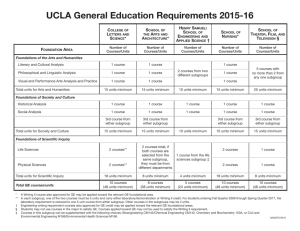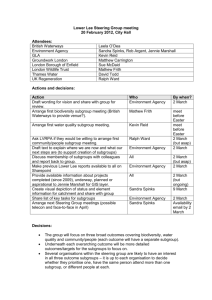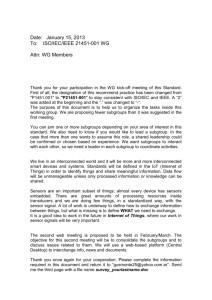Wed, Oct 30
advertisement
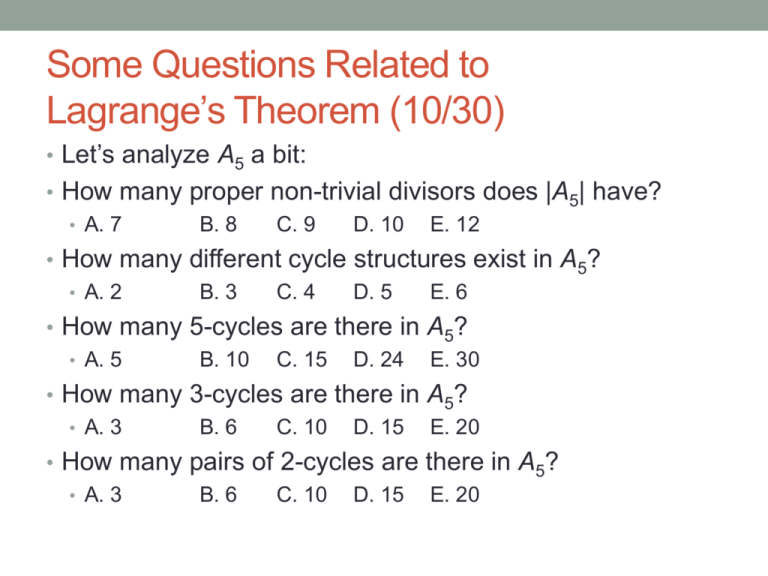
Some Questions Related to Lagrange’s Theorem (10/30) • Let’s analyze A5 a bit: • How many proper non-trivial divisors does |A5| have? • A. 7 B. 8 C. 9 D. 10 E. 12 • How many different cycle structures exist in A5? • A. 2 B. 3 C. 4 D. 5 E. 6 • How many 5-cycles are there in A5? • A. 5 B. 10 C. 15 D. 24 E. 30 • How many 3-cycles are there in A5? • A. 3 B. 6 C. 10 D. 15 E. 20 • How many pairs of 2-cycles are there in A5? • A. 3 B. 6 C. 10 D. 15 E. 20 Questions continued • How many subgroups of order 2 are there in A5? • A. 0 B. 3 C. 10 D. 12 E. 15 • How many subgroups of order 3 are there in A5? • A. 0 B. 10 C. 15 D. 20 E. 24 • How many cyclic subgroups of order 4 are there in A5? • A. 0 B. 2 C. 4 D. 10 E. 12 • How many Klein 4-groups are there in A5? • A. 0 B. 4 C. 5 D. 6 E. 8 • How many subgroups of order 5 are there in A5? • A. 0 B. 3 C. 6 D. 12 E. 24 • How many subgroups of order 6 are there in A5? • A. 0 B. 6 C. 10 D. 12 E. 15 And more... • Does A5 have at least one subgroup of order 10? • A. Yes B. No (If yes, what is it isomorphic to?) • Does A5 have at least one subgroup of order 12? • A. Yes B. No (If yes, what is it isomorphic to?) • Does A5 have at least one subgroup of order 15? • A. Yes B. No • Does A5 have at least one subgroup of order 20? • A. Yes B. No • Does A5 have at least one subgroup of order 30? • A. Yes B. No More Lagrange examples • Suppose a group G has subgroup H and K with |H| = 15 and |K| = 8. What is |H • A. 0 B. 1 C. 4 K| ? D. 5 E. all are possible • Suppose a group G has subgroup H and K with |H| = 20 and |K| = 10. What is |H • A. 1 B. 2 C. 5 K| ? D. 10 E. all are possible • Suppose a group G of order 24 has subgroup H and K with H |K| ? • A. 2 K G and |H| = 4. Which is a possible order of B. 6 C. 12 D. 16 E. all are possible Fermat’s Little Theorem, Etc. • What is 314 mod 13? • A. 1 B. 3 C. 9 D. 12 E. 14 • If p is prime and 0 < a < p, what is a5p – 5 mod p ? • A. 0 B. 1 C. a D. ap E. Can’t be determined • What is the order of U(24)? • A. 4 B. 6 C. 8 D. 12 E. 24 • What is 716 mod 24? • A. 1 B. 7 C. 10 D. 14 E. 21 • What is 7125 mod 24? • A. 1 B. 7 C. 10 D. 14 E. 21 • These last three involve the “Euler-Fermat Theorem”: If GCD(a, n) = 1, then a (n) mod n = 1. Assignment for Friday • Make sure all exercises in Chapter 7 already assigned are done (assigned on Oct 28). • Read the statement and proof of the “Groups of Order 2p” Theorem (Theorem 7.3).
